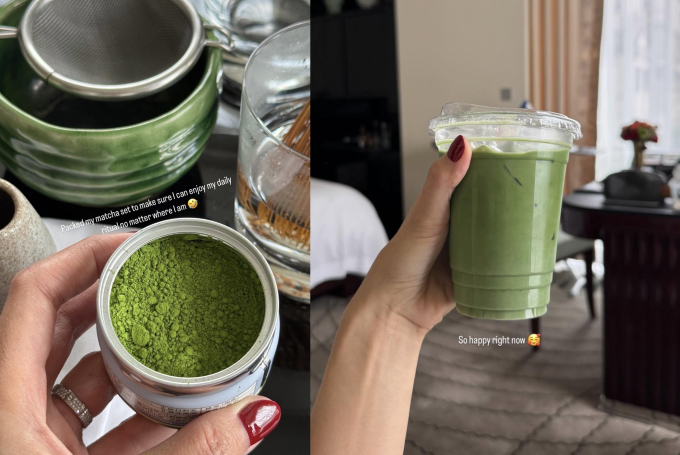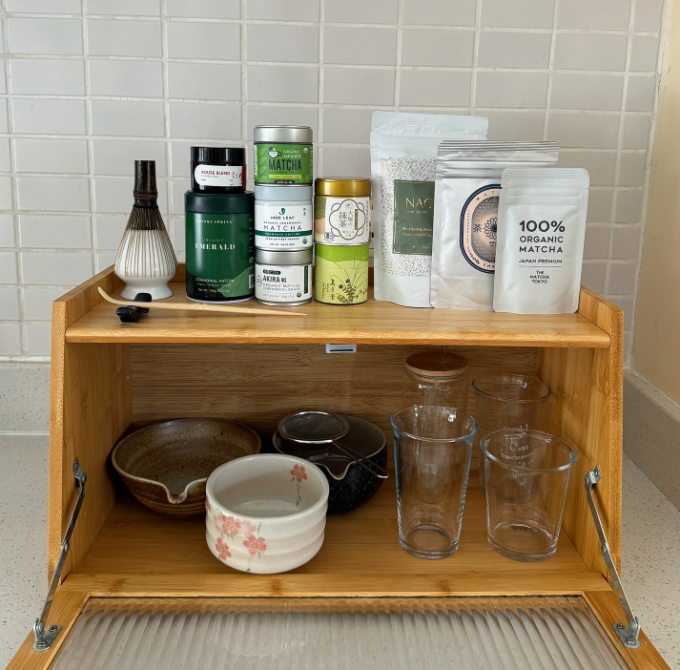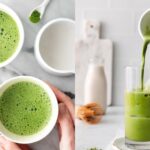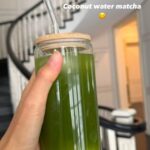
Vietnamese actress Tăng Thanh Hà has been showcasing her love for Matcha Latte during her recent travels and social gatherings. Hà Tăng, a mother of three, has invested in specialized tools to prepare this distinctive Japanese beverage, even bringing her own equipment on a business trip to Shanghai, China.
Instead of using regular milk, she often pairs matcha with plant-based alternatives such as cashew or oat milk. Occasionally, she adds coconut water or coconut sugar for a touch of natural sweetness.

Hà Tăng’s collection of matcha accessories showcases her passion for this beverage at home.
Matcha offers not only a delightful flavor but also numerous health benefits. It contains Epigallocatechin gallate (EGCG), a potent antioxidant that combats free radicals and inflammation, shielding the skin from UV damage. Catechin and polyphenols in matcha are powerful antioxidants that reduce wrinkles and age spots while also contributing to skin cancer prevention.
The caffeine in matcha stimulates blood circulation under the skin, imparting a natural glow. With a caffeine content one-third of that in coffee, matcha provides a gentler experience, reducing the chances of caffeine-induced heart palpitations, insomnia, and restlessness. Regular matcha consumption also diminishes the appearance of dark circles and puffiness around the eyes. The vitamin K, C, E, and panthenol in matcha promote healthy skin and hair growth.
Matcha is produced with stricter harvesting standards than regular green tea or green tea powder, using wind for drying without high temperatures to preserve its nutritional value. A cup of matcha provides 137 times more antioxidants than a cup of green tea, earning its reputation as a “superfood” and a key to longevity in Japanese culture.

Hà Tăng indulges in a matcha beverage at a café in Đà Lạt, located on Yersin Street.
According to EatingWell, the ideal time to consume matcha for optimal antioxidant absorption is in the morning. Nutritionist Joy Dubost recommends drinking it on an empty stomach to enhance absorption. Additionally, it’s best to avoid drinking matcha close to mealtimes; Chrissy Arsenaul, an expert, suggests a two-hour gap before or after meals. Adding milk to matcha may reduce its antioxidant capacity, so drinking it plain is advisable for those seeking maximum benefits.
The Ultimate Guide to Green Tea Skincare: 4 Recipes to Transform Your Complexion
Matcha has been a staple ingredient in many natural skincare routines, and for good reason. This powerhouse ingredient is known for its ability to transform dull and uneven skin into a radiant, smooth canvas. With its high antioxidant content and anti-inflammatory properties, matcha provides a host of benefits that promote healthy, glowing skin.



































